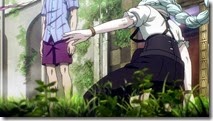 |
 |
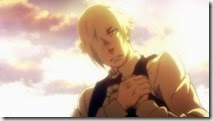 |
 |
 |
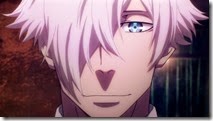 |
This is one of those shows that imposes the risk of having already said too much for me as a blogger. I mean, over the course of eleven episodes (and Death Billiards) I’ve laid out my feelings about this series and the people behind it pretty clearly by now, so there aren’t going to be many surprises. And the final episode was perfectly consistent and harmonious with the rest of the series in every respect, both thematically and qualitatively – it was the ending Death Parade deserved and that I always expected it to deliver. So I apologize in advance if this post covers a lot of familiar ground.
That consistency is one of the key elements of this series, though. There’s no question that Death Parade is a story that was conceived as a whole, written with the format in mind. This is the luxury of anime-original series – they can deliver complete stories that achieve closure without having to worry about addition, subtraction or communicating ideas that might not be well-suited to the medium. There are adaptations that achieve this too, or close to it, but it’s rare – a lot of things have to fit into place just right for it to happen, and they rarely all do.
In a very real sense, I think Death Parade stands as a kind of absolute contrast to Tokyo Ghoul, and it’s more than coincidental timing that makes me feel that way. Though it ended brilliantly that series was incredibly inconsistent, and never seemed certain of what kind of show it wanted to be. It very much seemed to suffer from a disconnect between what the original author wanted and what would work in anime form. DP is, as much as any series these days can be, a personal project for Tachikawa-sensei. He conceived it, wrote and directed most of the episodes, storyboarded several. Comparing it with TG should make the upside of this scenario obvious – the downside, of course, is that the end-product is only as good as the creator behind it. In this case that’s happily magnificent, and it really deepens my longing to see Morita Shuhei get a chance to direct material he himself conceives for series anime.
The interesting question for me – and I’ve asked it before – is whether Tachikawa Yuzuru had all this in mind when he wrote Death Billiards. Was that OVA an audition he passed, or was it simply so good that Madhouse refused to let it die? In the final analysis it only matters for curiosity’s sake, since the series is what it is – and whenever it was conceived, it was conceived brilliantly. This is a story that has a point, a reason for being told, and it’s not to sell discs (which is a good thing, because I doubt it will sell many). No, it’s the same reason why great stories over the centuries usually come to fruition – because the person who wrote them has questions to ask, and the writing helps them find answers.
The questions Tachikawa asks here are as fundamental as it gets – they probe the very nature of existence. And of sentience, too – and I use that word that quite intentionally, because in the context of this series’ mythology “human” is too narrow a term. What does it mean to be “alive”, and what does it mean to be self-aware? What happens to us after we die, yes, but much more fundamentally – what meaning do our lives have? Are we fundamentally alone in the Universe, doomed to never be able to understand those around us? The afterlife it presents is a fascinating construct in its own right, but I think Tachikawa-sensei clearly uses it primarily to probe the nature of life – not what comes after.
I’ve felt this for a while for a while now, and the finale confirms it for me: I think Tachikawa is saying that yes, we are fundamentally alone. No, we’re not capable of true understanding with others, and when our time is done what remains isn’t ourselves but a caricature of what we were – which is what the memory others have of us is. Those are the “dummies” that Decim keeps – those representations of the lives that have flickered and gone out. Perhaps our closest loved ones have rooms where our dummy has more detailed features, but over time even they fade (just as Decim’s memories do) – and no matter how detailed, it’s still a dummy. It isn’t who we are, or even who we were – it’s just how one person remembers us, and that only until they forget (or likewise pass from the Earth).
That’s a depressing notion in a vacuum, certainly. But it’s only half of what Tachikawa is saying here. All of that may be true, and life (and afterlfe) may be fundamentally unfair to boot. But that doesn’t mean we shouldn’t seize the day and make the most of every moment we have. The fact that we can never achieve perfect understanding with other beings doesn’t mean we shouldn’t try, and that we shouldn’t strive to make those we love happy while we’re with them. That’s root of Decim’s – this strangely wise and childlike “dummy” – personal philosophy. That’s why he respects those who “live for the moment”, even (and especially) after they’re dead.
I think it’s sort of funny that Light Yagami made a guest appearance in Death Parade, because a lot of the criticisms that were hurled against this show are actually kind of true about Death Note (as good a pulp thriller series as it was, and that’s very good). Tachikawa systematically tore down those criticisms with the work itself – that it was shallow, that it didn’t have a larger point. That it was presenting a skewed view of the Universe with no context as to why it existed. There was a point to everything that happened in Death Parade, and Tachikwa showed it to us to create a complete picture of a Universe he sees as fundamentally indifferent and unfair (or more accurately, indifferent to fairness). But over the course of the last few episodes he really showed us how much his larger his vision of life, the universe and everything is than just those harsh and bleak elements (indeed, I think the infectiously genki OP acted as a sort of hint that we should look past the darkness that dominated the early episodes).
I’m reminded of Woody Allen’s monologue from Hannah and Her Sisters, which comes after he’s just had a terrifying medical scare which had him contemplating suicide.
One day about a month ago, I really hit bottom. Ya know I just felt that in a Godless universe I didn’t wanna go on living. Now I happen to own this rifle, which I loaded believe it or not, and pressed it to my forehead. And I remember thinking, I’m gonna kill myself. Then I thought, what if I’m wrong, what if there is a God. I mean, after all nobody really knows that. Then I thought no, ya know maybe is not good enough, I want certainty or nothing. And I remember very clearly, the clock was ticking, and I was sitting there frozen with the gun to my head, debating whether to shoot.
All of a sudden the gun went off. I had been so tense my finger squeezed the trigger inadvertantly. But I was perspiring so much the gun had slid off my forehead and missed me. Suddenly neighbors were pounding on the door, and I dunno the whole scene was just pandemonium. I ran to the door, I didn’t know what to say. I was embarrassed and confused and my mind was racing a mile a minute. And I just knew one thing I had to get out of that house, I had to just get out in the fresh air and clear my head. I remember very clearly I walked the streets, I walked and I walked I didn’t know what was going through my mind, it all seemed so violent and unreal to me. I wandered for a long time on the upper west side, it must have been hours. My feet hurt, my head was pounding, and I had to sit down. I went into a movie house. I didn’t know what was playing or anything I just needed a moment to gather my thoughts and be logical and put the world back into rational perspective. And I went upstairs to the balcony, and I sat down, and the movie was a film that I’d seen many times in my life since I was a kid, and I always loved it. I’m watching these people up on the screen and I started getting hooked on the film. I started to feel, how can you even think of killing yourself, I mean isn’t it so stupid. Look at all the people up there on the screen, they’re real funny, and what if the worst is true. What if there is no God and you only go around once and that’s it. Well, ya know, don’t you wanna be part of the experience? You know, what the hell – it’s not all a drag. And I’m thinking to myself, Jeez, I should stop ruining my life searching for answers I’m never gonna get, and just enjoy it while it lasts. And after who knows, I mean maybe there is something, nobody really knows. I know maybe is a very slim reed to hang your whole life on, but that’s the best we have. And then I started to sit back, and I actually began to enjoy myself.
It will have escaped no intrepid observer’s attention that suicide is a recurring theme in Death Parade. It’s a difficult subject to say the least. In many faiths it’s considered among the most grievous of sins a human can commit, one from which there is no possibility of eternal salvation. There are multiple characters in Death Parade who commit suicide (some more literally than others) including the one who’s unquestionably the heroine. And even if it’s largely metaphorical, the issue of the eternal soul is certainly crucial in the literal narrative of the series. What are we to make of the series’ view on whether a suicide victim can indeed be “saved”? In this mythology, it seems, the key is whether or not one can come to realize the true nature of the deed – not just or even primarily the sin of wasting one’s own life, but the pain and suffering it causes to those left behind.
This makes me think of the Golden Gate Bridge. It’s a hugely popular place to commit suicide, and has been since it was built in the 1930’s. So much so, in fact, that in recent years a suicide barrier was finally erected over the loud protests of those who felt it would compromise the bridge’s beauty. It so happens that a certain percentage of those who attempt suicide by jumping from the Golden Gate Bridge survive, and in interviews later on they almost invariably come back to the same point – as soon as they were in midair, they realized how foolish they’d been. They realized that they actually didn’t want to die – or even more crucially (and with DP it’s an important point) that they wanted to live. In effect, these people were given a second chance – a hard and painful (both physical and emotional) one, but a second chance nonetheless. And that’s how I interpret the “good” elevator in Death Parade – a second chance, of a sort. It fits in Buddhist terms, but I believe it’s intended to be taken somewhat differently.
In the final analysis, Death Parade was more intricately plotted, more subtle, more intellectually ambitious and more humanistic that its critics accused it of being. The final episode certainly laid some interesting ideas on the table. The arbiters – even Oculus and Nona themselves – are dummies too, and made of the discarded souls that have passed through. What does that make them, if not much more human than they’re alleged to be? When Nona cries “There’s no way this world can be right the way it is right now!”, that’s the helpless indignation of everyone who’s ever railed against the unfairness of life, and a cold Universe which seems to hold little regard for our happiness. And she goes further – it’s not wrong for the arbiters to suffer when they make judgments. In fact, it’s vital – because to be forced to face the painful and difficult and make choices is what makes us alive in the first place. And arbiters, these so-called “dummies”, are very much alive.
And painful this is for Decim, most certainly in Chiyuki’s case. It’s not difficult to see early on that the journey he takes her on and the choice he offers her are false (now we know why he ordered those memories) – themselves part of his role as an arbiter. But while this may seem cruel and unfair itself, it’s the only way Decim knows to relate to the world. He wants to know Chiyuki better, just as he wanted to know all of his “guests” better. And the knowledge that this is likely illusory doesn’t make watching Chyuki’s visit to her home any less agonizing. She’s a kind and empathetic person, clearly, but one who made a terrible mistake – and she’s being shown just how much pain that mistake caused the person she loved the most. To see Chiyuki’s mother preparing food for a daughter who’s gone, clutching at the “Chavvot” dolls she made for her (just as Decim makes dolls of those he wishes to remember) is truly heartbreaking both for Chiyuki and the audience.
I was certainly repeating “Don’t press it!” urgently to the screen as I watched this unfold – not just or even mostly because I knew this was a test, but because I knew it was wrong. And I knew Chiyuki did, too. Iwaaki-sensei makes the point at the close of Kiseijuu (Madhouse’s other gem which ended this week) of how the lives of those we don’t know hold less apparent value than the lives of those we do, but Tachikawa goes at it from quite a different angle here. He focuses (through Chiyuki’s minds-eye) on the fact that everyone is precious to someone, and that every life is fragile and priceless. Ultimately Chiyuki realizes that no matter how terrible the mistakes we make, we must accept responsibility for them – we cannot pass the cost on to others. And she must bear with the knowledge that she cannot make amends to the ones she’s hurt via her mistake – not in this life, anyway, though perhaps somehow in the next one.
If this is the lesson for Chiyuki in her test, and she passes it with dignity, the lesson for Decim is much as Nona describes. He experiences a pain he’s never experienced before – the regret he feels over the impermanence of the lives that touch his magnified a thousand times by the urgency with which he wants to understand Chiyuki. But he still tried to understand her – even if the effort was unnatural, difficult and ultimately painful. And in the end because of that pain he’s able to do something else he’s never done before – smile. He smiles for Chiyuki, and because of the connection they’ve made. It’s a truly beautiful and bittersweet moment – an acceptance that there is no joy without pain, and that ultimately life is a series of compromises. Accept that which is unfair and cruel, and do our best to reach each other in the imperfect manner that’s all we’re capable of. It comes down to a simple question – do we live so that we may someday die, or do we die because we have lived?
This is where Tachikawa leaves things, elegantly open-ended in lifelike fashion. Memine has left Ginti’s side, but he now has a Kokeshi in her image – the proof that she made an impact on his life. Nona is content to let her revolution simmer for now, though she’s clearly not prepared to let Oculus’ vision proceed unchallenged. And as Chiyuki goes on to her reincarnation, a new dummy resides at Quindecim – one which seems altogether more lifelike than any that came before it. This is neither a happy or tragic ending, because existence is more than those simple concepts – they’re part of it, but it transcends their meaning. It’s exactly the place I would have expected Death Parade to leave things, because it’s the only place it could and still be true to itself.
As Death Parade now sails off to commercial oblivion, it’s a good moment to reflect again on just what a miracle it is that series like this ever get produced in the current anime climate. If the price for one Death Parade is Mahouka or Mahou Sensou – hell, ten Mahoukas – I’ll pay it. If that cost is what it takes for Madhouse to keep producing subtle and powerful series that have a larger purpose than simply making money, I’ll gladly pay it – there is no reward without pain, after all, and fans of quality anime know that all too well. And I’ll be eagerly waiting to see what Tachikawa Yuzuru does next, because with the brilliant and ambitious Death Parade he’s stamped himself as one of the best and brightest in anime.
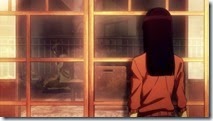 |
 |
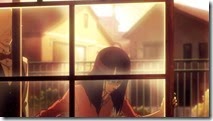 |
 |
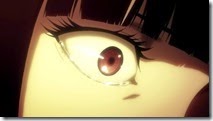 |
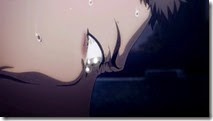 |
 |
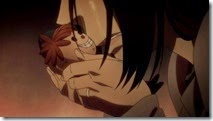 |
 |
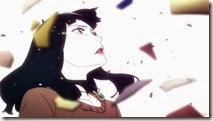 |
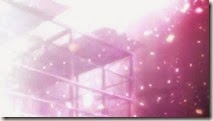 |
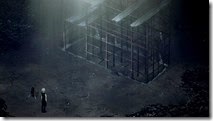 |
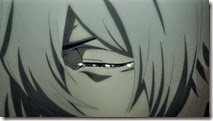 |
 |
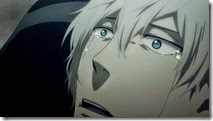 |
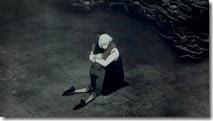 |
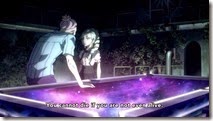 |
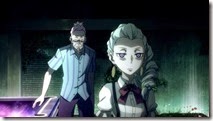 |
 |
 |
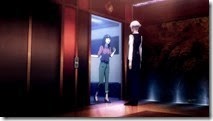 |
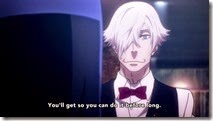 |
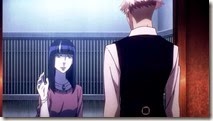 |
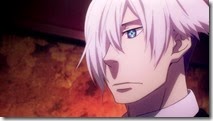 |
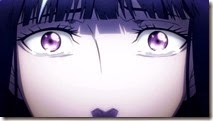 |
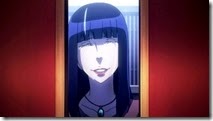 |
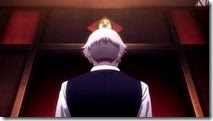 |
ED Sequence:
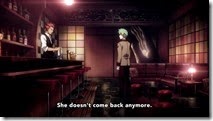 |
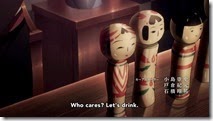 |
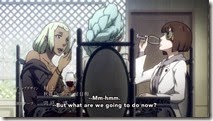 |
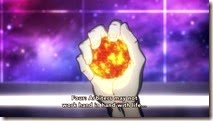 |
 |
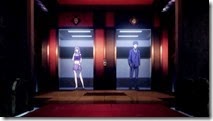 |
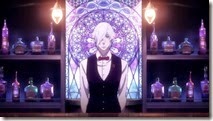 |
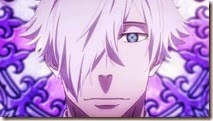 |
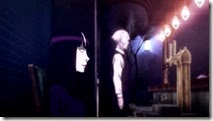 |


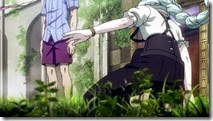
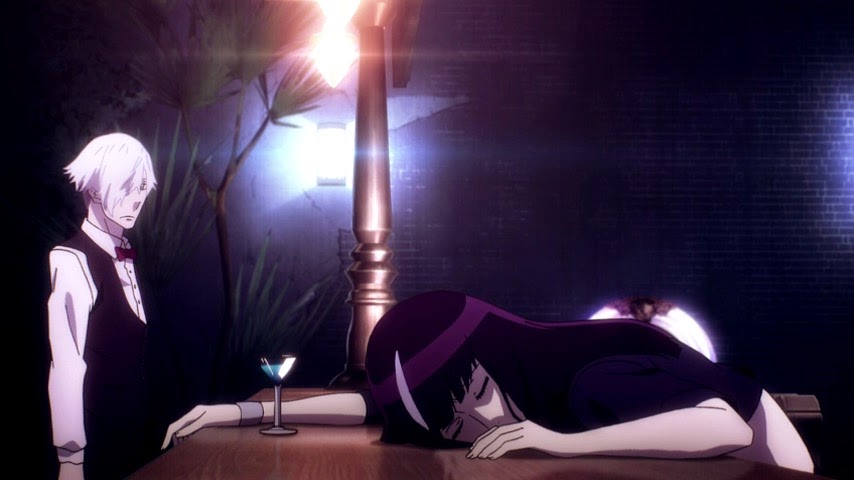
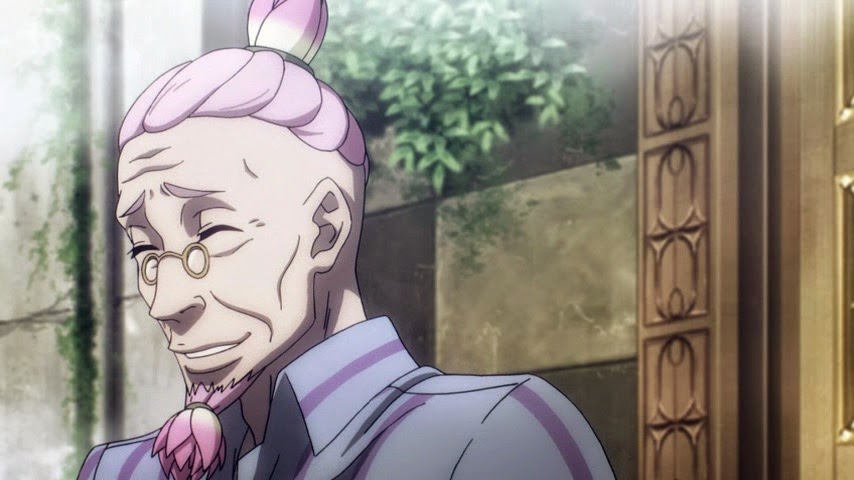
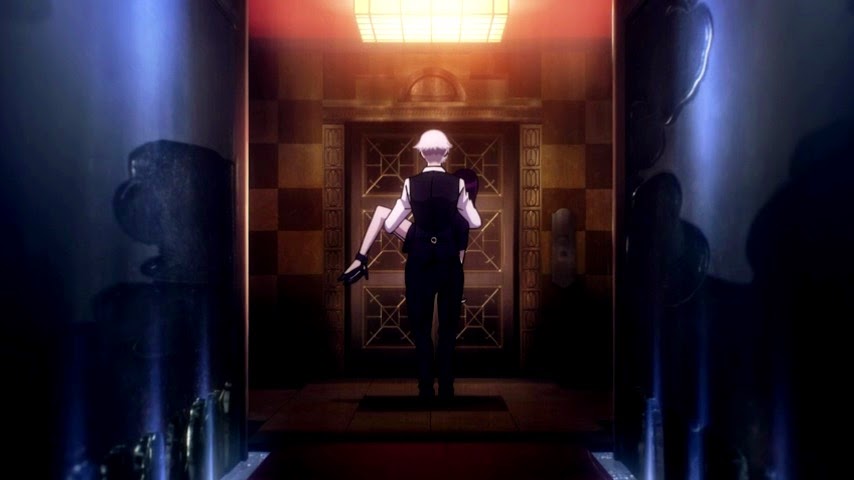
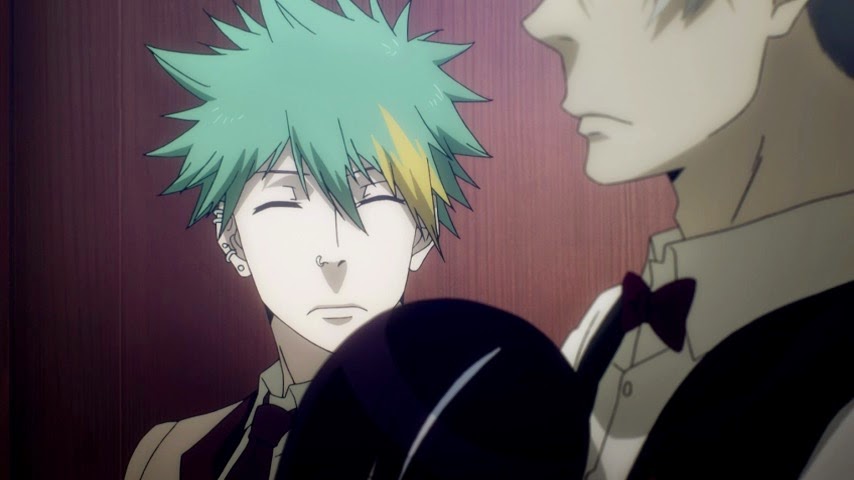
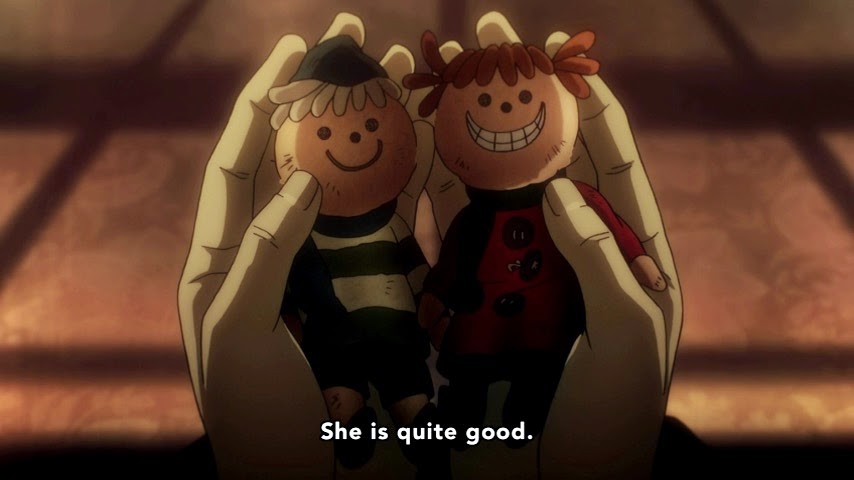
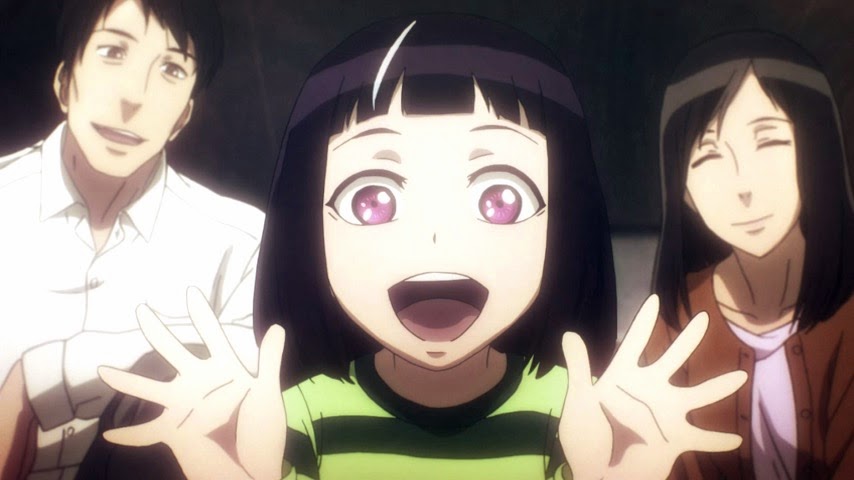
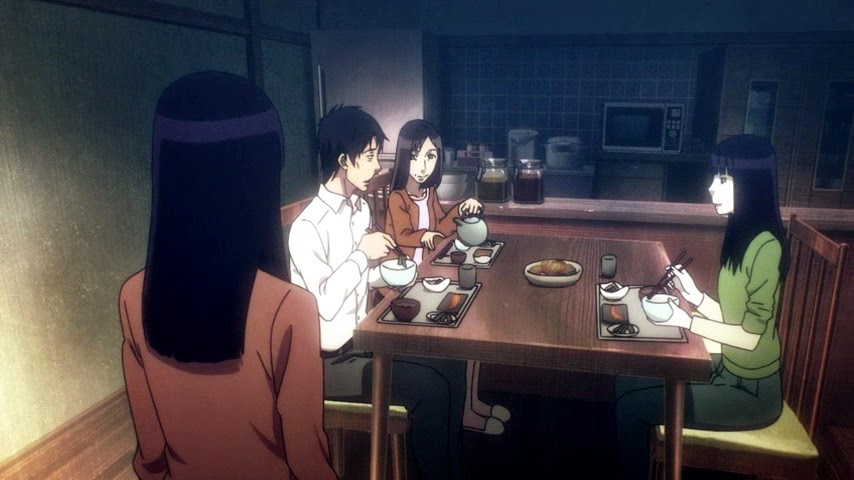
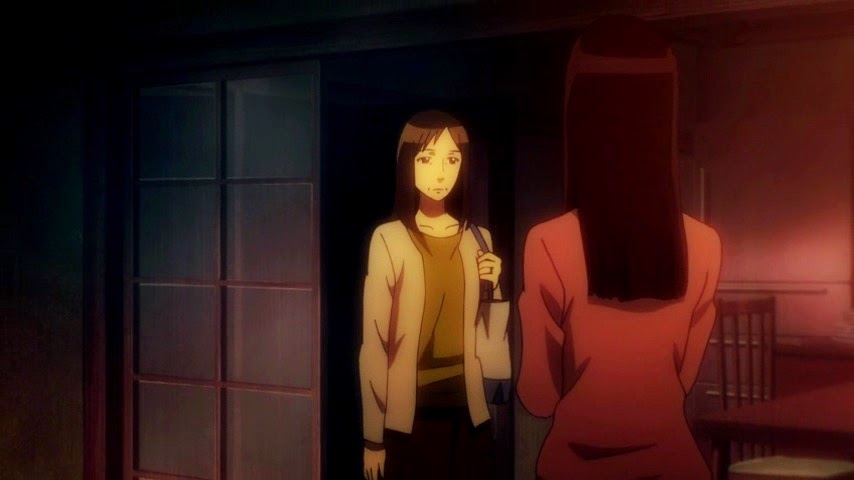
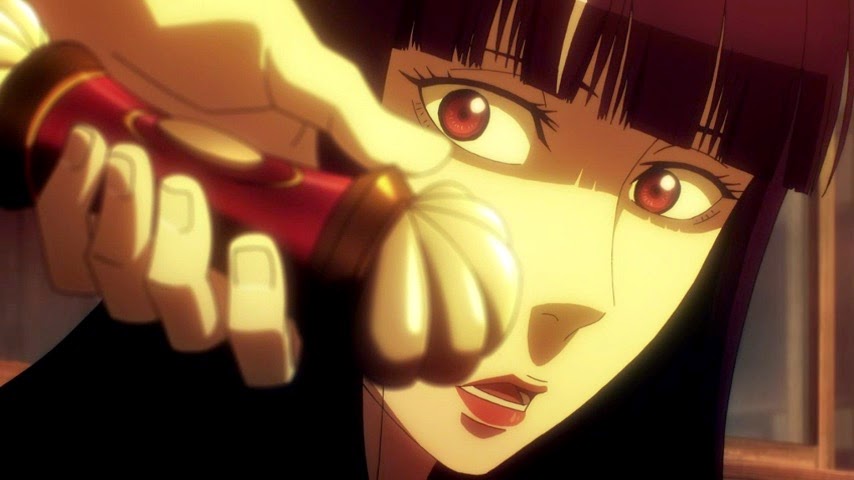
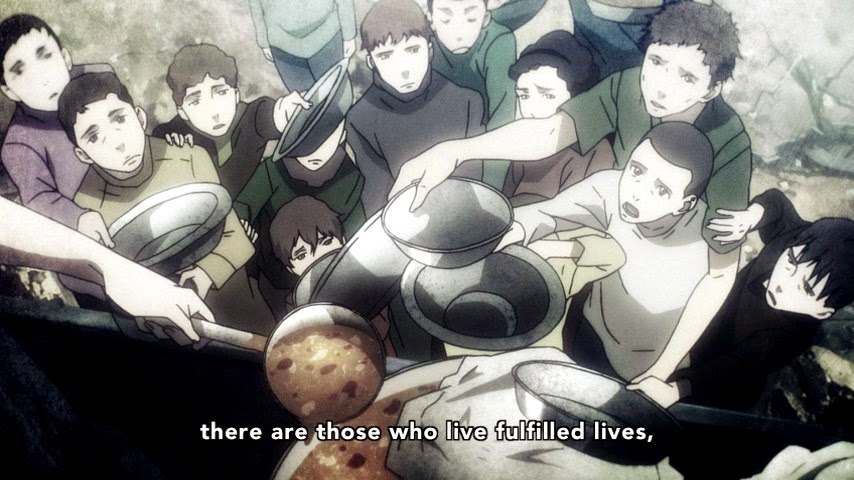
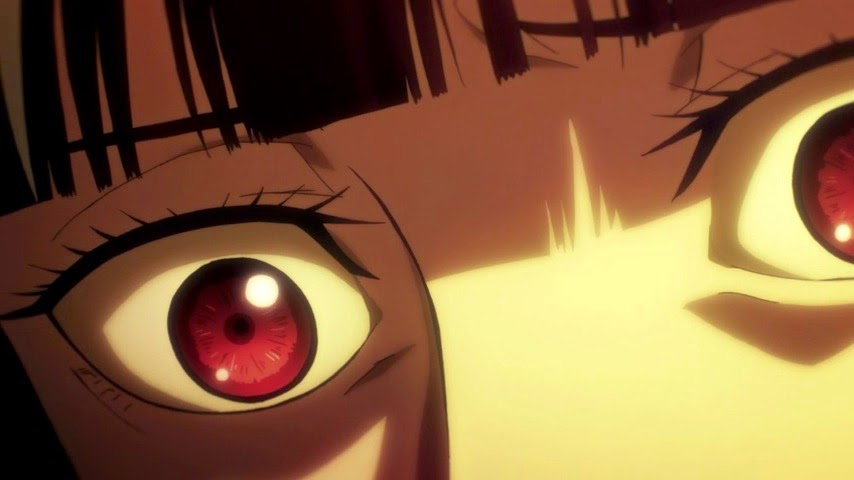
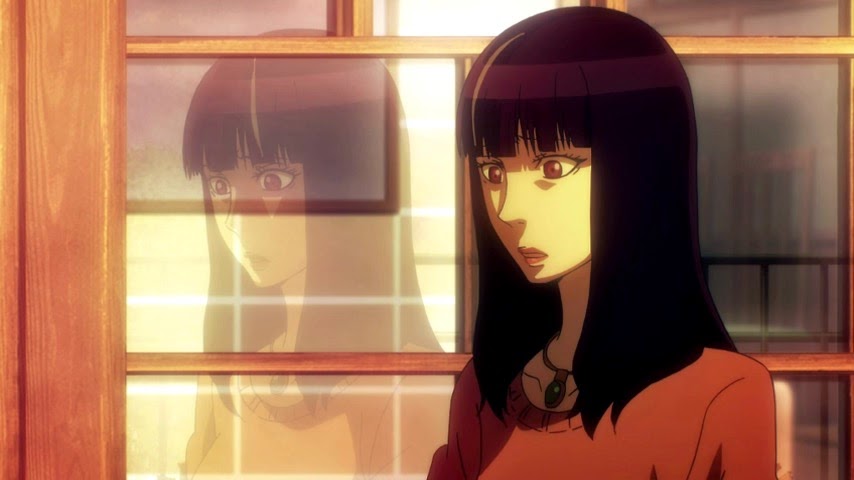
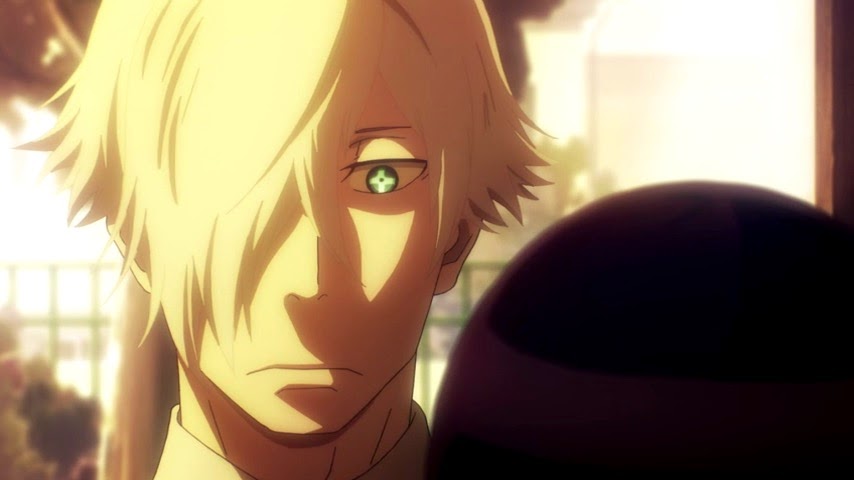
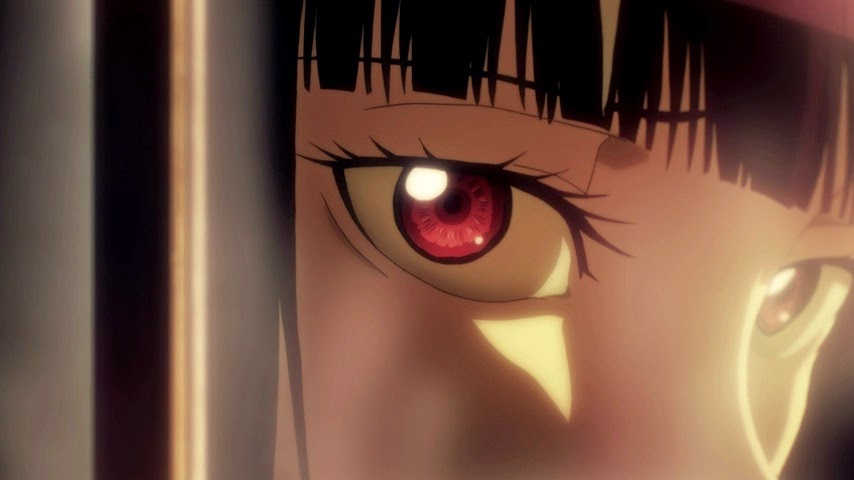
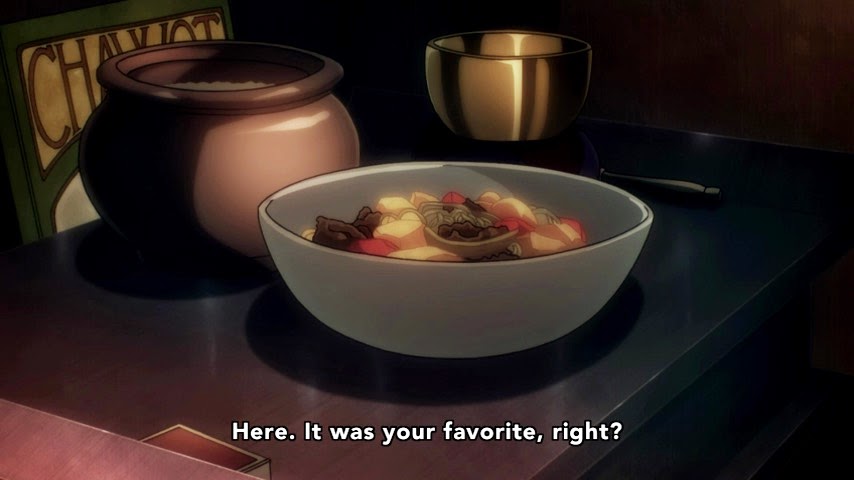
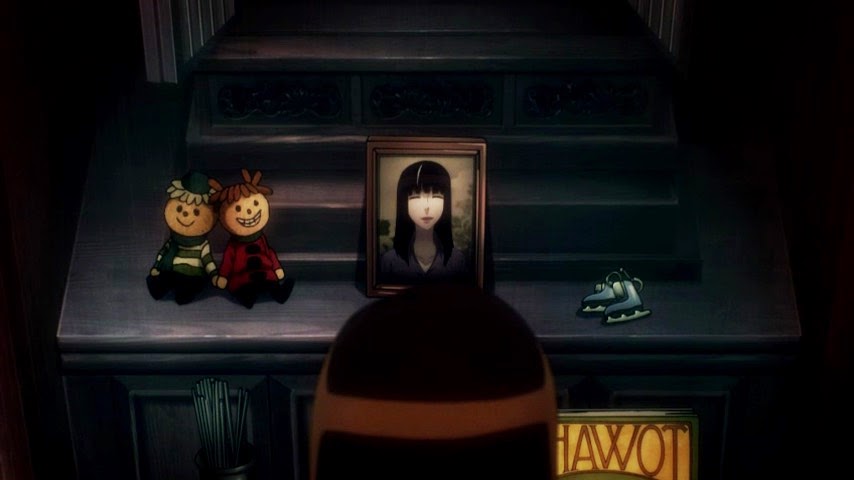


Flower
March 28, 2015 at 9:34 amExcellent wrap up review of the series. Many thanks. 🙂
What more can one say of the final moments of the ED? It was so … perfect. I especially loved the last seen of the Decim's assembled dummy doll of Chuyuki holding the handmade dolls of the children's story she loved. So … fitting. ^^
Revy
March 28, 2015 at 9:42 amWell that's a show I won't soon forget. It's always fascinating to think Death Billiards spawned this beauty, and love how you posed that question in your review. The urge for more is real at the moment, but I know it told the story it had to tell. Hopefully Death Parade will manage modest sales and give incentive for more of these type of works.
vincee87
March 28, 2015 at 9:59 amSo much contemplation on the meaning of life and being human in the span of 2 weeks. As always, thank you for your coverage of the show Enzo.
Kurik
March 28, 2015 at 12:47 pmBrilliant review Enzo….touched on how i felt and much more. You are quite the insightful individual. Let's hope this coming spring we have sometihng that is at least as half decent as this to review/watch.
Jay Psi
March 28, 2015 at 12:58 pmWhoops, spotted something wrong hence the repost.
A quick correction – it was Mayu's kokeshi doll and not Memine's. I'm surprised you didn't spent a bit more time on that, with the unsurprising implication that Ginti has been through multiple assistants and at the very least driven them all away, if not condemned them all as well. I take that as a small nod to the other side of the coin – that you can choose not to connect with people for whatever reason, but the effects on both their life and yours are that much more hollow and superficial, as Ginti's dolls are to Decim's mannequins.
I hadn't heard that about the thoughts of would-be suicides at the Golden Gate Bridge before, but just from hearing about it it strikes me that the ED seems to cover exactly this scenario of a person who has chosen to condemn themselves but in the moment of the act (past the point of no return) they come to regret it. Or maybe I'm reacing again, it's been that kind of series.
Between this and Parasyte (it looks like Migi did manage to reach Chiyuki after all!) there's been a lot to think about in the past couple of weeks.
MgMaster
March 28, 2015 at 1:04 pmI'm one of those people who initially didn't see what the hype about Death Parade was all about. Believing that it was gonna be a pretty looking anime that follow's a "judgement of the week" scenario while patting itself on the back for managing to show the darkness in people through these highly questionable means.
What followed was me eating my words week after week. To me it's one of those shows that slapped me in the face for my ignorance & prejudice and towards the end, it even went a bit beyond that. I love when a series does that. It makes me feel that my pleb mind has been a little more enlightened :P. Based Madhouse, I'm terribly sorry for doubting you when most signs were showing otherwise!
Hangman
March 28, 2015 at 2:15 pmThe resolution of Chikyuki and Decim was superbly done so I don't need to re-tread what's already been said. However, last week was such a brilliant penultimate chapter, so much so, that I felt the finale just didn't quite complete it. In fact, its opened-ended resolve regarding the judgement system reminded me of the contentious Psycho-Pass/sibyl situation.
From a critical eye, this series was built on the pretense of an overwrought afterlife system riddled with glaring problems to begin with. You could argue some of the foils introduced were even unnecessary as fundamentally judging human nature is an arbitrary/flawed exercise. But as I've expressed before, I was hoping the series was taking all that world building/Nona's experimental drive somewhere more 'concrete', but the effects of her tampering is swept under the rug with little consequence of change explored. Yes, DP thematically embraces its message towards embracing life/expressing empathy, but I think it's fair to ask and see the fruits of this shift impact the judgement construct and its inhabitants. This ominous world building should have either been further explored considering how fatalistic it was chalked up to be, or simplified all together (think Death Billiard days) to let Decim and Onna's metaphysical journey speak for itself.
Death Parade had masterpiece episodes for sure, but when considering the whole uneven package, it falls short of a masterpiece for me. I imagine that's not what most of you want to hear about this great show, but I don't think it's wrong for art as handsome as this to be meet with a healthy dose of scrutiny.
admin
March 28, 2015 at 2:28 pmI disagree with the meat of your argument, though I'll hold off on "masterpiece" till I have time to digest. I think the disconnect here is that you're responding as if the plot were the major focus of the series, whereas I believe the symbolism was the real purpose and the plot there to support it. Either way it amounts to an interpretation of Tachikawa's intentions.
Hangman
March 28, 2015 at 3:08 pmThere's certainly a disconnect, but not with the major focus. In-fact I'm really addressing the plot as the Achilles heel. However, I do think it was wrought up as too essential of an element in the show not to be given more focus. The alternative suggests that there was already too much on Tachikawa's plate (bless him) with the symbolism, that perhaps the show may have been better off striping down the plot.
elianthos80
March 28, 2015 at 3:25 pmWhile I'm satisfied with what we got thematically, there is enough left open on the mythology side for some more Death Parade if circumstances will ever allow to. For sure I wouldn't mind some bonus material ^^
Jay Psi
March 28, 2015 at 4:20 pmAs much as I love the series I get that criticism. The conflict between Nona & Occulus was built up significantly but ultimately it gave way to a "wait and see" outcome which seems unsatisfactory when both parties were so invested in their ideas on how soul arbitration should proceed.
Earthling Zing
March 29, 2015 at 3:41 amIts just a pity that this show will probably never get a second season…
Earthling Zing
March 29, 2015 at 4:19 amThe ending does bring to my mind the ending of Shinsekai Yori, where the protagonists admitted that their society was badly flawed but could not do anything to change it. Unlike SSY Death Parade has a lot more possibility of change but still very difficult and daunting, people definitely need to be sent to the void since they hinted at some calamity occurring with so many deaths.
I do like that its reincarnation thats the alternative and not a second chance at life, makes both options kind of sad in a way. Too bad Ginti never took back his explanation about the void being full of despair, although I suspect that was just a way for get Mayu judged.
admin
March 28, 2015 at 2:25 pmHey, it was 16 paragraphs as is – you can only touch on so much, you know?
There's a fascinating documentary called "The Bridge" about the GG suicide phenomenon, which has a lot of interviews with survivors.
http://www.imdb.com/title/tt0799954/
elianthos80
March 28, 2015 at 2:54 pm@Jay: interesting point about Migi's dialogue, I was actually thinking of that passage during Chiyuki's breakdown.
Whle you rise a good conclusion about Ginti's connection ability I'm not too sure about the premise of the Mayu kokeshi doll hinting at Ginti having had a whole series of assistants before her. The only other regular assistant we saw is Memine and for all we know is a cat, as such she come and goes according to her own will without yielding to anyone else's agenda 😉 . I had rather gotten the impression Nona's action plan started with Decim's peculiar attitude as the catalyst and Mayu ended up at Ginti's side after (and because of) the Ginti-Chiyuki connection effects showing bit by bit.
Personally I like to think Mayu has left a mark and a seed of change even in the seeming impermeable Ginti also because it would add a further push to the empathy course attempt in the whole arbitration system, but considering the open-endedness regarding Nona's plan either interpretation works 🙂 – and those kokeshi might well be Ginti's ever-growing memento of what fools these mortals be instead :,D – .
@Enzo: overachiever :p. But we like you that way…
Thanks for the link and quotes. And these reminds me I still have that Allen's movie to retrieve while I have broadband.
Jay Psi
March 28, 2015 at 3:09 pmHehe, point taken GE. It was quite the write-up regardless and I don't think any less for not covering that scene in great depth. Thanks for the link as well, I'll check out the documentary as son as I can.
Elianthos, I'll admit that I immediately took to Ginti as a foil to Decim which has influenced the way I interpreted the scene with him & Clavis, especially after seeing Decim attain a fleeting moment of humanity. But I do agree that Mayu has left her mark on Ginti and not just from the obvious (the doll). Beyond that either your explanation or mine fit as you said, it's just a question of preference. =)
elianthos80
March 28, 2015 at 3:18 pmP.S.: about Memine… her name is most likely modelled after the Latin verb 'memini' =' I remember', as Decim's cocktail features its future imperative 'memento mori'.
It's a defective kind of verb, made of shift structures (perfect acting as present and so on) and a conjugation full of holes. It's the one verb sharing the same stem of 'memory', in itself a net ot remembrance and oblivion, the strongest yet fragile foundation of our self. How fitting for ultimately a tale and reflection on empathy, where bridging the void and finding a shared meaning is key to acknowledging and finding the value of existence.
Good job Madhouse, good job.
melodic thoughts
March 29, 2015 at 3:48 amOn the contrary, I feel like the director opened up the possibility for a second season (if there could ever be one), it ended rather on an open end, and proposed plot lines that could be further explored instead of answering questions. I do hope there is one, after Madhouse creates more profitable shows.
Earthling Zing
March 29, 2015 at 4:14 amThe possibility is there thanks to the storyline, but probably obliterated thanks to how satisfyingly the series ended and the fact that it would probably get poor sales.
admin
March 29, 2015 at 4:44 amI don't think the issue is whether the story could support it – certainly it could. It's a matter of it being a miracle that the show was produced at all, given how uncommercial it is. It's sure to lose money and that makes a second season an extreme longshot.
wut
March 29, 2015 at 6:04 amAmazing show–I have nothing meaningful to add to everyone's praise, so I have inane questions instead:
Did the elevator guy suddenly develop a personality after bringing Decim and Onna to the 1st floor? And when Decim apologized for keeping him waiting, what did the elevator guy mean when he responded, "It's okay. Usually it's the other way around"? It might be that he's just referring to everyone having to wait for he and the elevator to arrive, but it seemed like the line had some meaning beyond that.
Zeroyuki92
March 29, 2015 at 1:42 pmI'm still quite puzzled here, Enzo. I do love almost all of DP's episodes, but I have no idea what to think about this one.
Yes, I think I get what the series trying to concive with this last arc. However, I still can't wrap my head in at least these two events:
1. Chiyuki's 'decision'. So, with swaying from "Yes, I wan't to live again', to " No, I can't live again only to seperate a random person who has people that love him/her", to "I want to live again, but I can't take that decision. Please help me to leviate the burden to decide that". I understand that Decim simply want to understand her further, or probably he would like to see if Chiyuki could once again embrace her life. But in the end I have no idea what to think about the entire process related to Arbiter. If "trying to understand" is the idea behind all of this, wouldn't this change will simply make a "judgement" become "rehabilitation"? Wouldn't trying to understand and finding the best inside a person will simply cause bias? If a person has commited serial killings and in the end you understand his motive and you could find a better person inside of him, would giving amnesty become the better solution? Wouldn't bringing the best of a person simply bring a temporary 'light' in his/her heart? Assuming soul will keep circulating, would that solution make a world to be better or worse?
The reason why I have no idea what to think about this last arc is simply because Chiyuki ultimately is a good person. She's not much different with the gamer guy who was also given redemption, and either way I doubt any arbiter will send her to the void (Unless there's an arbiter who simply judge her by the way she ended her own life, but we never shown anything like that). To test how will this new concept works, I think Chiyuki's case simply did not suffice.
2. In the end, they also end the whole conflict behind the main stage with little (if any) closure. They show clues that arbiter changes, however no one made any action after the whole commotion (besides of an addition of a new rule) and no one other than Decim made any notable changes, let alone the system itself. While it's realistic and filled with subtle things, I just find it lacks any resolution in the grand plot and thus leaving it simply as a story for Decim, making all the additional focus toward the background story (mostly I think being the low points of the series) seems rather futile to me.
In the end, I still liked DP very much, and some of the judgement episodes are absolutely brilliant. However as a whole I don't think I find the whole effort to construct the whole world and background effective, and if I could decide something, I'd rather have the entire series filled out with only Decim, Onna and Judgements (with Decim development left intact, but without politics in the background). That could be only me though, and I still appreciate the effort which were made to unify the entire story.
Earthling Zing
March 29, 2015 at 4:44 pmI don't know, the politics led to some interesting musings, maybe even the best parts of the series… The judgements could have used a bit more variety though, having some starving African people or something would really throw a wrench into this morality thing.
Hangman
March 29, 2015 at 11:44 pmYeah, why do we only see middle class Japanese people enter/undergo the soul arbitration? Would have loved to see a variety of ethnicity/social backgrounds.
admin
March 29, 2015 at 11:58 pmBecause this is a Japanese series?
Hangman
March 30, 2015 at 2:13 amJust a reminder, not every japanese cartoon exclusively features japanese characters because it's made in japan.
eternia
March 30, 2015 at 3:18 amThere is a change.
The previous judgements are often too cruel and time alloted.
Under such circumstances, even good people will become evil.
It was unfair.
In Chiyuki's case, she was given a lot of time to think.
And I think Decim will change himself countinously.
As he do more and more judgement.
Because he has a human heart.
And that's exactly what Nona wanted.
Oculus, the old man, on the other hand, dislikes human heart because he afraid that it will disrupt the objectivity of the judgment.
So, in the end, does this trik of Nona produce more good result, or bad result.
Only time will tell.
It's a beautiful open ending, for a 12 episode anime.
admin
March 30, 2015 at 7:10 amDo people watch CSI or Breaking Bad and ask "why are there only Americans on this show?", I wonder?
Hangman
March 30, 2015 at 7:45 amBoth those shows deal with specific US locations, so no, not really. Could it be Quindecim is floating over Japan, like the tardis? Who is to say where this fictitious afterlife takes place, especially considering it utilizes a blend of cultural influences. "Because it's made in Japan" shouldn't stop them from from including other walks of life – wouldn't that be expected in an all encompassing afterlife?
admin
March 30, 2015 at 8:38 amI didn't see any Buddhists or Hindus in "Defending Your Life" or "Heaven Can Wait" (or "Here Comes Mr. Jordan" for that matter).
I think it's a very ethnocentric view common to Westerners – especially Americans – that the rest of the world owes it to them to feature people who look and think like them in their fiction. I don't think Japan or anyone else has any obligation to include Judeo-Christian beliefs or Westerners in their TV or movies, including anime. If they choose to make an "all-encompassing" story, fine – but the absence of it is not a fit reason for condemnation, in my view.
I would also point out that Death Parade makes no pretense about this being an all-encompassing afterlife. This mythology is clearly framed around Buddhist belief. I didn't see people complaining about Japanese themes in Hoozuki no Reitetsu – it just so happens that because it's a satire they acknowledged what was happening and even included cameos by Satan and Lucifer, but it was "Japanese Hell" both in literal and metaphorical terms. I have no problem with that.
Hangman
March 30, 2015 at 11:52 amHnR was clearly written as a satire of "Japanese Hell", so that's to be expected isn't it. DP isn't quite so binding.
I don't really have an issue with DP being ethnocentric, but some of the plotting throws that into contention. The scenes between Nona and Castra/Quin seem to suggest that they manage/process 7.1 billion souls of the world's population. And since Buddhism could potentially encompass China, India, Thailand or other East Asian cultures, it creates a broader range for consideration. Perhaps the current focus is really just supposed to be Japan, or Nona's tower is the Japanese department? It's just conjecture in the end.
Intentional or not, I can't expect Tachikawa to reasonably fit all that in to a 12 episode anime (which is part of why I think the plot could have been slighter, but hey), but the open ended writing encourages these questions for sure. Thinking about a show like Death Parade deal with the moral plights similar to 'starving Africans' or 'spiritually trodden Syrians' sounds pretty amazing and exceptionally heart breaking.
Anyway, thanks for elaborating your view. It's an interesting area that is almost always taken for granted in this medium (especially in the age of Lite Novels), and DP being an original work highlights an opportunity to ponder at the possibilities of more outward thinking anime. Space Dandy sorta fits the bill would you say?
admin
March 30, 2015 at 12:32 pmThere are plenty of manga that take all-encompassing views of the world, and (unless you count stuff like Hetalia) they don't seem to be getting adaptations too often. Any new series, original or otherwise, is an opportunity to be more outward-thinking but it's not a requirement.
Space Dandy is to be admired for taking a completely different view on trying to be profitable by being a "world" anime (it premiered in English before Japanese) and I'd love to see more studios try to think outside the box that way. But when I get an exquisitely told and beautifully produced series like Death Parade, I'm not going to obsess over whether it's too Japanese or not. I'm just going to be happy it was brilliant.
Earthling Zing
March 30, 2015 at 2:21 pmThanks for arguing my point for me Hangman. Heh, I was just musing about the premise a little, the show would definitely be a commercial disaster if it had that kind of scope. I don't think that people from third world countries would even know how to play the games in the series, that'll lead to too huge a burden on Tachikawa Sensei. Am just really glad that a unique premise like this got the execution it deserved.
Kaname
March 29, 2015 at 3:56 pmA great anime.
At the end though, is this one giant exam?
Kaname
March 29, 2015 at 4:18 pmDamn, I read your review again Enzo and I'm awe all over again. That review of yours is amazing! It is sincere, genuine and honest. I'm happy to have the privilege to read your work. Thank you!
admin
March 29, 2015 at 11:59 pmThat's kind of you, thanks. DP brought out the verbosity in me. If you can't do quality do quantity I say…
Steven Ostuni
March 30, 2015 at 2:15 amGreat review!- also hate to burst your pity bubble Enzo, but commercial oblivion is one place Death Parade ain't going. It's pretty much the hypest thing this season, and nearly every anime fan I know is watching it. I'm guessing it'll leave it's mark pretty hard on the anime world, and might even become a classic.
admin
March 30, 2015 at 6:31 amI'm guessing nearly every anime fan you know isn't Japanese, and thus not part of the group that overwhelmingly determine commercial success even for shows that eventually get licensed. It's your word against Stalker, and sadly Stalker rarely underestimates shows by the amount it would have to for Death Parade to make money.
eternia
March 30, 2015 at 3:11 amThis was totally great, and beautiful. I have to apologize to the author and the studio for hating it during episode 1 and 2. The author himself knew that the universe that he created is unfair and unclear. But apparently, that's not what he wants to tell us. This story is great lesson on how you should respect your own live and other people's lives (even those you don't know), even though these lives of our are short lived.
It's an animation, but it's life lesson surpassed any live action movies in my recent memory.
Now, let's mark it 10 on MAL and declare it a classic.
😀
Jaypee Juanerio
March 30, 2015 at 3:37 amEnzo, great review always..
Quick question..
Is the review your longest single episode write up yet?
admin
March 30, 2015 at 6:33 amI believe the final ep of E7 AO and a couple H x H were a paragraph or two longer.
Zeta Zero
April 4, 2015 at 11:30 amNeeds 10 years before it can be declared a classic.
Akka
October 10, 2015 at 12:48 pmI'm pretty impressed by your analysis about the memory & dummy stuff. That it's symbolism to reflect what mark we leave in the world during our life, and that this whole afterdeath might be just a parable about how we should consider our judgments on others and our action in life. Rather spot-on after reading it.
That being said, on the serie itself I, like I said in a post in the previous episode, just can't get past the whole Void thing. With the two choices being reincarnation and eternal damnation, it basically means everyone is condemned to eternal damnation in the end – you just get more "tries" until you fuck up bad enough, or some arbiter fuck up bad enough, to send you to Hell.
I have a hard time finding the hope spot or the silver lining when the worldbuilding is so stacked toward bleakness. I get that this whole Hell (and it's really Hell if it even remotely looks like what Ginji has described) part it's not the main point and the important part is the message, but it still exists in the context of the story and I can't cast it aside if I'm to relate with more than a pure intellectual exercice. I think that they just overdid it there, and could have simply made it "soul obliteration" instead of "eternal suffering".
DP is beautiful, moving and deep, but it's also extremely bleak and depressing. Also, I'd level the criticism that it's a bit too much a slave to its message, and ends up feeling like it cut corners in the plot/story/consistency department in order to just illustrate said message.
And now I really need some light-hearted comedy.